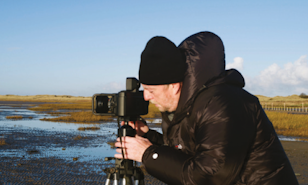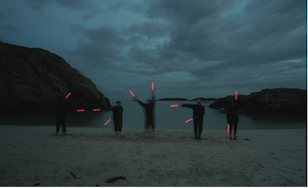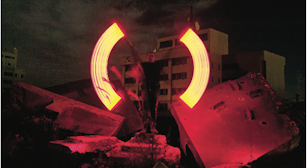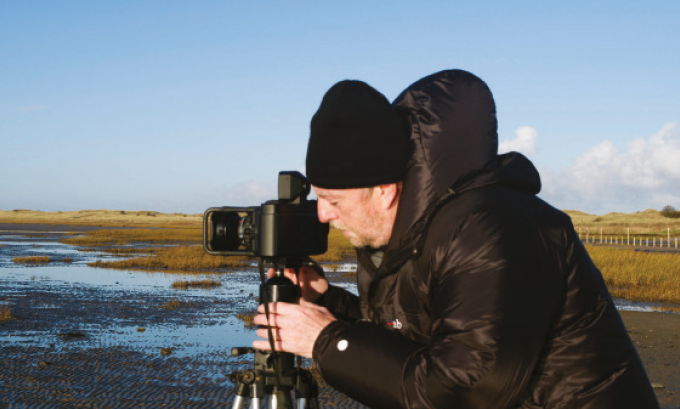
One Friday afternoon in 1998 I was making a film at Liverpool Street station. The ‘on set cellular phone’ rang. It was Chris Wainwright, then my immediate boss at Central Saint Martins. He demanded that I return to college for a meeting I was meant to be chairing but was playing hooky from. I think I had called in sick earlier in the day, but somehow Chris had found me out – he was good at that. I was in the middle of shooting so I couldn’t go. Chris was apoplectic with rage. In those days mobile phones could get very hot while talking; this one felt positively on fire.
I spent the entire weekend anxious about the private, and very likely disciplinary meeting that I had been summoned to by Chris. First thing Monday morning I arrived outside his office. Chris was often described as a gentle giant, which he certainly was, most of the time. But he could also make you nervous, and he was making me very nervous that morning. Chris had a stern, unsmiling PA at that time and she made sure that I sweated a little. You can go in now, she instructed after at least five nervous minutes. The phone had not rung, nor a light flashed, so just how was that interregnum wait outside the office managed and measured, I wondered? I think they had a system, she and he, and they were using it to dramatic effect that morning. Close the door, Chris barked; things did indeed look very bad.
Chris sat at his enormous oak desk and stared at me. I began blurting out excuses for why I scheduled my film production to coincide with a committee meeting. Chris let me jabber on until I eventually ran out of steam. The room was silent again and Chris continued to stare. I could see that he was trying to work something out; and surprisingly he was not angry. Finally, he smiled. He had, he told me, been looking at my proposal to start a new art publication in the School of Art. He could allocate a certain amount of budget that year, and he wondered if it would be enough to get the project off the ground.
The proposal that he referred to was the one that my friend Charles Esche and I had sketched out quickly on a napkin during lunch at an unexceptional Chinese restaurant in Liverpool. With Chris’s energetic support that quick sketch became Afterall. Chris was unstintingly generous and his support for our project, at the very moment when I had obviously most irritated him, was testimony to this charming and defining condition of his. A few years later we knocked on his door again, this time with less responsibility to disappoint (he had reasonably and perspicaciously relieved me of much of my management work). We need to expand, Charles and I told him, we’re going to produce books. Fantastic, Chris replied and he made sure we got the support we needed.

Chris was generous. He was also armed with an unbridled enthusiasm for most things cultural. Twenty years of administrative work did nothing to diminish Chris’s preternatural curiosity and delight in the new and the unknown. Afterall fit well within this big-hearted remit of his; he thought that the project was worth it and he gave it his best support throughout his tenure at Central Saint Martins and even later when he moved on to a different part of the university. Intellectual support was always easy for Chris; it was what he readily offered whenever he got excited about something. Other people, similarly generous, can be distracted by whatever pops up on their radar and as a consequence, their older flirtations can wane. This was not the case with Chris. A colleague once told me that many years after Afterall was founded, College Management suggested some changes to Afterall’s status in the university. Chris threatened immediate resignation and there was no further discussion. Chris did not directly participate in Afterall – he was too busy with his myriad responsibilities and his own art; but he always understood how important it was to fight for our shared project. He let me know this on more than one occasion, and I was grateful to hear it.
I don’t think I ever saw Chris without his signature impish grin; except of course when he was angry with me, which I admit was often. But even then, I remember counting down in my head, in anticipation of when his irresistible smile would finally break surface. By the time he turned 60, Chris struck me as someone who inhabited the world as if still an excited teenager, that is, as someone who believed that the future was theirs to shape and own. And just like a young person, Chris’s giddy cocktail of optimism, pride and enthusiasm allowed him to imagine that his inventive support for something he believed in could make a difference. That strikes me as an important lesson for us all.
– Mark Lewis

How is ecosystem thinking taught, learned and lived? The dependencies that connect humans to nature become familiar through encounter with the unfamiliar, through what Henry David Thoreau called ‘contact with the Not Me’. Chris Wainwright orchestrated such encounters – with the sea and its environs – for hundreds of people through projects such as Cape Farewell, the Hermitage Moorings, Dazzle Ship London, Futurelab, his light works with semaphores and internationally crewed expeditions on the open ocean. Alongside (or instrumental to) his prolific creative practice that spanned photography, performance and installation work, Chris led immersive experiences for artists, scientists and researchers at sea – creating a supportive space for those aboard to expose themselves, on the one hand, to human finitude and planetary fragility, and on the other, to human and planetary grit, periodicity and resilience.
Most recently, with his partner in life and art Anne Lydiat and friends, Chris organised What Has to be Done (2013–16). Patterning new modes of art and environmental education, the project took the form of a series of participatory voyages, an exhibition and a publication. All unfurled over the course of four years and as many forays in the Western Scottish Isles on the tall ship the Lady of Avenel. Connecting efforts across epochs, the boat navigated in the wake of an earlier voyage undertaken by Richard Demarco, the Scottish artist, curator and educator behind Edinburgh Arts, and Joseph Beuys. Demarco and Beuys sailed on the Marques (1984), a vessel for education and art creation designed after Charles Darwin’s HMS Beagle (1831–36).
Chris aligned himself with radical forebears – artists, scientists and educators – whose sensibilities and explorations opened worlds even while predicting their ends, giving voice and form to environmental hopes and fears, addressing environmental injustice head on. A methodology of following necessarily leads to the consciousness that others not yet known are not far behind. Acting from an essential tenet of environmentalism, Chris left things better than he found them for those to follow. He left his friends and collaborators with a set of skills, a kit of tools, and a way of being and working together – in short, an education. Elaine Scarry writes, ‘By perpetuating beauty, institutions of education help incite the will toward continual creation’. Chris’s work generously seeded the will towards continual creation in the face of environmental crisis.
In Schools of To-Morrow, John Dewey writes, ‘No book or map is a substitute for personal experience; they cannot take the place of the actual journey’. I think of Chris’s approach to art, education and environmental activism as in alignment with radical educators ranging from Dewey to Paulo Freire – Chris Wainwright supported the production of environmental knowledge through experiential learning geared toward ecological (and social, political and economic) change. His work challenged the ideologies that would have us believe that environmental exploitation and planetary collapse are preconditions of modernity, even while advocating for a deeply felt environmental literacy that gives language and form to the human/nature nexus and land/water interbody that supports life on Earth.
– Kendra Sullivan
